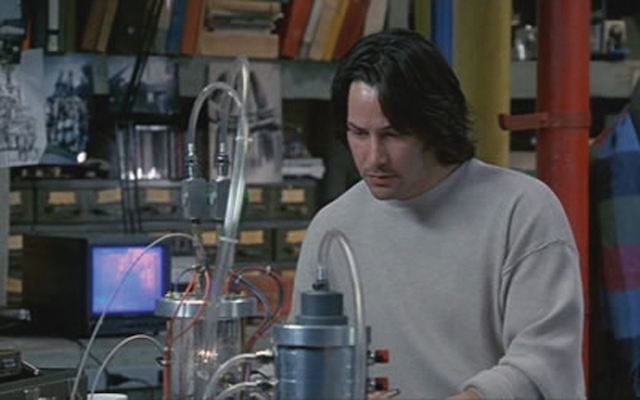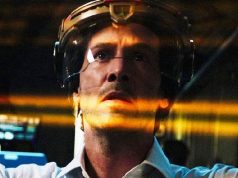
People have made fun of “Chain Reaction” for being the movie where Keanu Reeves plays a rocket scientist, but this is inaccurate and I won’t stand for it. Keanu’s character works with physicists, not rocket scientists, and Keanu himself is merely a machinist. Granted, he is a machinist who dabbles in science and comes up with the solution to all the world’s energy problems one night in his apartment. Nonetheless, he is not a rocket scientist. (“Keanu Reeves is not a rocket scientist” isn’t something you’d think you’d have to spell out very often.)
“Chain Reaction,” directed by Andrew Davies, is about the search for clean energy solutions to cure our reliance on fossil fuels and ZZZZzzzzzzz. Forgive me, this topic is very important in real life but very boring in movies. To spice it up, “Chain Reaction” does things like have Keanu outrun an explosion on a motorcycle. This happens early in the film, and something similar occurs near the end. The notion of Keanu moving faster than the speed of blast waves is amusing, sure, but it’s disheartening when a movie about physicists openly defies the laws of physics.
Keanu (it doesn’t matter what his character’s name is) works at the University of Chicago with a team of scientists who are thisclose to figuring out how to yank the hydrogen out of water and use it as energy. They’ve got all the necessary equipment: a big laboratory, federal funding, white coats, bubbling tanks of liquid, Morgan Freeman in charge, etc. The only remaining piece of the puzzle is finding the right frequency at which to run the regulator so it stabilizes the reactions from the whatever and the hey-hey and the glavin. Keanu finds this frequency by chance one night at home. I don’t understand the science involved, but I take comfort in knowing the movie doesn’t, either.
Anyway, no sooner have Keanu and his lab-mates celebrated their success than their work is stolen and the laboratory blown up. We’re told that the explosion leveled eight blocks of the south side of Chicago. (It’s implied that this is bad.) Government and law-enforcement types are pretty worked up about it. There is extensive news coverage, even a congressional hearing! Eight blocks completely wiped out! How many casualties must there be? That is a trick question, because the movie’s answer is zero. Or at least none are ever mentioned. Not one of the many people outraged or panicked by the incident ever cites the death toll. So either the neighborhood was completely and literally unoccupied by humans at the time of the explosion, or the people who were there followed Keanu’s lead and escaped on supersonic motorcycles when they saw the blast.
Keanu and his physicist colleague, Dr. Lily Sinclair (Rachel Weisz), are as eager as anyone to find out who did this. As Keanu explains, “Whoa.” But the bad guys have framed Keanu and Dr. Lily by planting incriminating evidence in their homes. Morgan Freeman asks Keanu about the money the FBI found in his apartment. Keanu’s reply is: “What money?” Now, here’s the thing. Keanu’s character — fine, his name is Eddie — Eddie really doesn’t know anything about the money. The cash was planted there. This is genuinely the first he’s heard of it. Yet Keanu is so unconvincing an actor that when he said “What money?” I thought Eddie was lying. Keanu is unable to convey honest surprise. The only way to get that emotion from him, I assume, is to actually surprise him. And yet experts warn against this, as Keanu can be unpredictable when startled, even dangerous. So putting Keanu in your movie is a no-win situation, basically.
From this point, “Chain Reaction” is a “wrongfully accused man runs from the authorities while trying to clear his name” action flick. It’s a tale as old as time, as obsolete as Newsweek. In addition, it’s a lot like “The Fugitive,” which came out three years earlier and — get a load of this coincidence — was also directed by Andrew Davies! The difference is that instead of Harrison Ford saying “I didn’t kill my wife!” and Tommy Lee Jones saying “I don’t care,” it’s Keanu Reeves saying “Whoa!” and an FBI agent played by Fred Ward saying [before submitting column, remember to scour “Chain Reaction” screenplay, find a single interesting line of dialogue, put it here].
Among the many things that prevent the film from being engaging or exciting or not stupid is its flagrant disregard for the laws of time and space. I will give you a few thousand examples.
1) When Keanu and Dr. Lily’s pictures first start appearing on the TV news as “persons of interest” in the explosion, a bar patron recognizes Keanu, alerts a passing police officer, and a foot chase ensues. In a matter of seconds, while the foot chase is still happening, the FBI field office gets a phone call from the Chicago Police Department telling them about it. That means someone at the Chicago P.D. heard it on the scanner, thought, “Oh, I bet that’s the guy the FBI is looking for,” looked up the number for the FBI field office, called it, asked for the agent in charge of the investigation, and got patched through to him — all inside of 30 seconds, and before the cops had confirmed that the guy they’re chasing, who was pointed out to them by a random civilian, is even the guy they’re after.
2) Keanu and Dr. Lily escape to Wisconsin — a clever move on their part, since the preposition one normally expects in that phrase is “from,” not “to.” Nobody knows where they are. From a pay phone, Keanu calls his boss, Morgan Freeman. The FBI has tapped Morgan Freeman’s phone, of course, and they trace the call. In less than 30 seconds, not only have they traced the call, but they’ve notified local Wisconsin police, who have dispatched several officers, who are arriving on the scene just as Keanu hangs up the phone.
Basically, the film takes place in a world where all the following things are true:
– Motorcycles travel faster than shock waves.
– Either eight city blocks are wiped out without anyone dying, or else hundreds of people die and nobody mentions it.
– Keanu Reeves knows enough about science to create clean, cheap, renewable energy by accident.
– The communication between law-enforcement agencies on the federal, state, and municipal levels is faster and more efficient than what they have in “Minority Report.”
– Rachel Weisz is willing to spend time with Keanu Reeves.
I can accept maybe one or two of those things. But all of them? All at once? In the same movie? That’s asking too much. To quote one of the foremost rocket scientists of our generation, “Whoa.”
— Film.com





